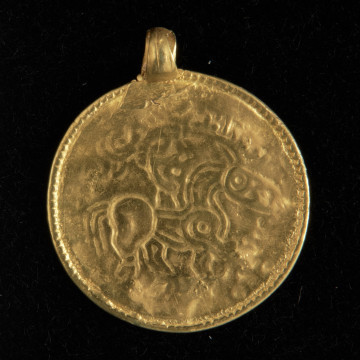
Bracteate
National Museum in Szczecin
Part of the collection: Antiquity
The gold bracteate (a single-sided coin, without the reverse) with an eyelet is slightly deformed and scratched. Its rim is decorated with an imitation of a beaded wire. The eyelet attached at the top has three ribs. The bracteate depicts a highly stylised image of a rider on a horse. Under the horse’s chest, there is a runic inscription LAUKAR. This bracteate was most probably struck with the same stemple that was used to mint an analogous coin from Skåne County. The image of the horse rider is a reference to the representations of the Roman emperors depicted on the coins and medallions known in central and northern Europe in the second half of the 4th century and the beginning of the 5th century. Some researchers consider that this could be a representation of Odin (Wodan) riding on Sleipnir. The bracteate comes from Scandinavia; analogous bracteates were found in Søtoftegård (western Zealand), southern Sweden and Bornholm. A similar example of a Scandinavian bracteate with runic inscriptions found in the Polish land is the specimen with sabar inscription, from the town of Wapno in Wągrowiec poviat.
Bartłomiej Rogalski
Author / creator
Dimensions
cały obiekt:
Object type
exchaneg media; money; coin; bracteate
Technique
forming; punching
Material
gold
Creation / finding place
Owner
Muzeum Narodowe w Szczecinie
Identification number
Location / status